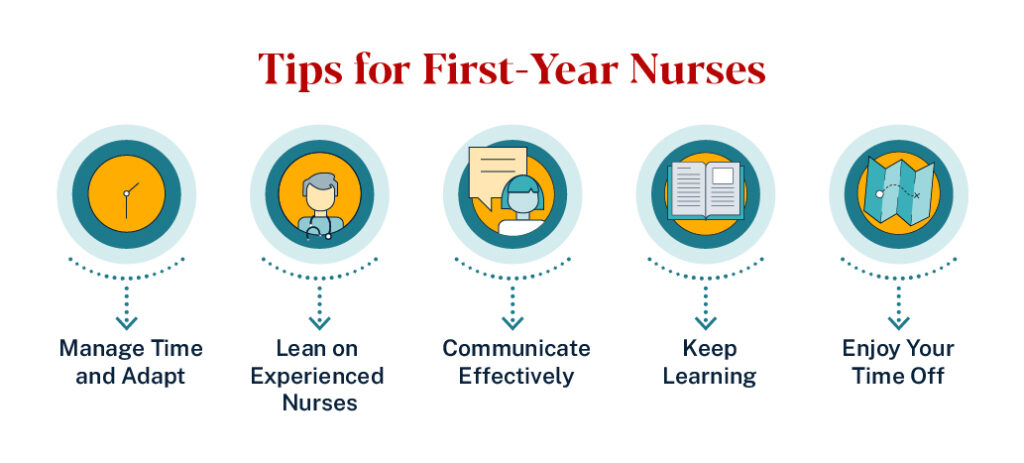
I remember feeling excitement and anticipation after graduating nursing school as I was getting ready for my first nursing job. What I quickly learned is that your first year as a nurse can be overwhelming, and the key to success is openness to growth and productive criticism.
According to the American Nurses Association, 18% of nurses quit in their first year, and this is an honest testament to the difficulty first-year nurses face. The transition from nursing student to a career in nursing is important. Let’s talk through what to expect during your first year and how to make the transition as smooth as possible so you can focus on providing outstanding patient care.
You’ve Graduated, Now What?
First things first. The question everyone has asked you since you started nursing school is “Where do you want to work?” This encompasses everything from facility to specialty. When you start looking for nursing jobs, keep in mind what you were interested in and drawn to during your student clinicals. Even though many new nursing graduates go into medical-surgical nursing, don’t hesitate to go into a specialty if that inspires you. As long as the job description does not require previous experience, facilities and specialty units are often willing to train new hires.
How To Prepare for Your Nursing Interviews
Yay! You have an interview. Now it’s time to familiarize yourself with questions to ask during the interview process.
One thing that is very important to know is the nurse-to-patient ratio. This essentially tells you how many patients you’ll be responsible for and how many nurses there are to carry the weight. Large nurse-to-patient ratios can increase workload and lead to burnout quickly. In your first year as a nurse, you are still learning how to handle patient priorities and time management, so you want to be intentional about where you work. Low nurse-to-patient ratios allow nurses time to care for their patients and generally provide safer patient outcomes.
You’ll also want to know if there is a charge nurse or resource nurse available. These nurses are experienced nurses that help during admissions, discharges and IV placement if new nurses need assistance. Charge nurses also provide assistance during procedures. This support is especially helpful to new nurses when it’s their first time performing procedures. Additionally, experienced charge nurses provide emotional support during times when new nurses become overwhelmed.
Another helpful question to ask during an interview is how long staff have been on the unit. This question gives you an understanding of the culture and environment. When nurses feel appreciated and enjoy their unit and coworkers, they will stay there. A unit that has several nurses that have been there for many years often have a good work environment.
I also ask if there are mandatory call hours for floor nurses. Units that are understaffed or are not staffed by float nurses will require on-call hours in addition to regular shifts. As a new nurse, the extra hours can lead to poor sleep schedules, lack of self-care and mental health disruptions.
Last but not least, one of the most important questions for new nurses to ask during an interview is about the orientation process. Orientation is where you learn the computer systems and processes of the unit. Extended orientation is essential for new nursing graduates to build relationships and become acquainted. Specialty units usually have an extended orientation process, even for experienced nurses. It’s critical for new nurses to feel proficient with their workflow during orientation. Building relationships with preceptors and coworkers during this time helps build confidence as nurses learn the ropes. A new nurse is more likely to ask for help after creating a bond with others.
Making Your First Nursing Job a Success
Congratulations, you landed a job! Transitioning from nursing student to new nurse can be challenging, but with a few survival tips, you will be off to a great start.

During nursing school, you learned to manage time for studying, homework and family. This is actually quite similar because you will be managing your time at work as well. New nurses must understand that you can’t predict how the day will go and the ability to adapt to changes throughout the day is essential. While your day may consist of lab draws, procedures and passing medications, there will be times when you must adjust your plans when critical situations arise. Because of the unpredictability of a healthcare setting, prioritizing time management and adaptation are two ways to overcome the workload.
It’s also very important to seek support when difficult situations arise. You don’t have to pretend you know everything while you are continuing to learn in your new position. Experienced nurses understand this. Having the ability to ask for help is a characteristic that will benefit you in the long run. New nurses that have mentors feel supported and have increased confidence throughout their nursing journeys. Mentors help new nurses in the work environment by giving advice, reflecting on situations and refining skills. They are also beneficial on a personal level to overcome the stress and emotional exhaustion of developing into a nursing professional.
Next, prioritize effective communication skills. You want to have strong communication with coworkers, patients and managers. Feeling confident when communicating is a major challenge for new nurses. Knowing how to communicate effectively helps to relieve anxiety and produce desired results. Nurses are constantly communicating with providers, patients and their families. Remember, communication is verbal and non-verbal. Non-verbal communication is essential when educating patients and providing a positive bedside manner.
Keep a mindset of learning. Having a learning attitude allows you to be open to suggestions by others and receptive to information to improve patient care. The nursing profession is constantly growing and discovering advances. Keep up your nursing education by reading published articles and joining nursing associations. Nursing associations offer support and help connect you with other nurses.
Spend time with friends and family. It’s easy to be consumed with your new profession. Making time to hang out with friends is a good way to decompress from the challenges in nursing. The strain of life or death can take its toll on nurses, and they need to remember that while their job is critical to the community, it’s important to take care of physical and mental health as well. Do things that make you happy outside of work. Long work hours may make you exhausted mentally and physically. Remember to get plenty of sleep and eat well to avoid burnout. Nurses are known for their unhealthy food choices and caffeine intake while on the clock, but don’t forget to consume fruits and vegetables when the stress of a 12-hour shift is over. Drink plenty of water and practice self-care to get your body ready for the next shift.
The first year of nursing is hard and filled with many challenges. With the right attitude and these tips, you are well on your way to overcoming the obstacles. Keep a positive attitude, take care of yourself and before you know it you will be an experienced nurse giving the same advice to other first-year nurses.
Prepare your nursing career or advance to a higher level of care with the nursing programs at American College of Education.

